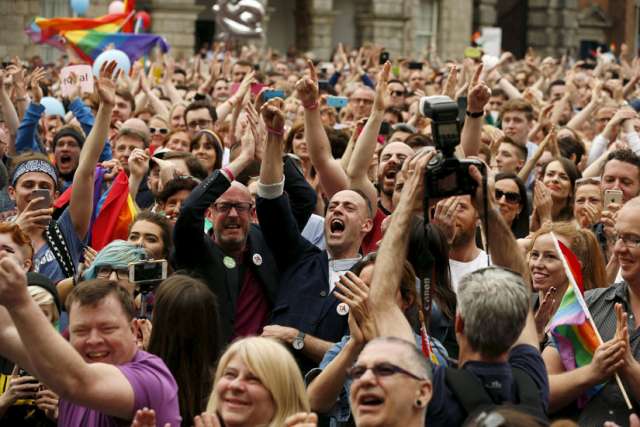Waters had a 25-year career at the Irish Times wrecked over a recklessly false accusation of homophobia based on his purported opposition to homosexual marriage. When I interviewed him for Traces magazine in the aftermath of the accusation, and the eventual apology and damages he won through legal action, he was still bewildered, betrayed and doing his best to ward off bitterness.
As Waters said, the accusation itself, made by a drag queen named Panti on an Irish TV talk show, was inflammatory nonsense. The accuser did a verbal drive-by, naming Waters as one of several high-profile commentators who opposed gay marriage because of homophobia. Waters, who began as a rock music writer before turning to political journalism, has been a campaigner for father’s rights in Ireland. He had not commented about gay marriage pro or con.
“(The accusation) just wasn’t true,” Waters told me. “There are people in Ireland who think I’m a bit of a draft dodger when it comes to some of these moral issues because they suspect that I should have these views, but I’ve never expressed them.
“It’s not that I do or don’t have the views. My view never corresponds entirely to the one side and is never entirely opposed to the other. It is my own view based on the process of reason.”
What flabbergasted, and then deeply wounded, him was the refusal of his journalistic colleagues to stand with him as he pressed for correction of the demonstrable falsehood. Instead, it was assumed if the accusation was made, it had to be true. He was criticized for refusing to let the lie pass quietly, and for seeking damages when the TV station failed to apologize for airing it.
“They actually conflated the question of homophobia with the question of seeking damages: the seeking of damages became an act of homophobia against the guy who had ‘merely expressed,’ as they said, ‘his opinion.’ They forgot he had named certain people, including me.”
A consequence of his “being almost pecked to death” by the media was that Waters went from passive to active in the Irish gay marriage referendum. Though the issue wouldn’t make his list of “top 100,000 things that matter to Ireland,” he spoke out against the abdication of journalistic responsibility to fairly and effectively report all perspectives. He argued the wording of the constitutional amendment would reduce the family to a mere economic unit.
Ireland’s turn to gay marriage by a popular vote is being presented as an historic defeat for the Catholic Church. It might be. Waters, however, sees an even more profound loss: the capacity of a civil society to debate with vigorous reason what it seeks to sustain, reform or transform.
Whether one agrees with homosexual marriage or not, he argues, the tactical addiction of gay hegemonists to besmirching opponents with the tar brush of “hate” is toxic to democratic argument and authentic change.
“This is what we have come to by virtue of the unaccountable surrender of our political class and media to perhaps the ugliest lobby group to cast its shadow over Irish life in the years of our independence,” Waters wrote in the Irish Independent. “Held to ransom by a tiny indigenous minority with global muscle, we are enjoined to reach a sabotaging hand into our Constitution, and anyone who dissents becomes an instant public hate figure.
“This is Ireland 2015 — an Ireland where reason is alien, where the truth fears to speak its name in the face of hatred, demonization and lies, and our… free press not merely averts its gaze but runs, when it can, with the mob... The lobby behind the same-sex marriage amendment includes elements that are nasty, out of control and indifferent to democratic values.”
A key word there, of course, is elements. Waters isn’t saying, and it isn’t true, that supporters of gay marriage are implicitly culpable. It’s equally possible to advocate with reason and reasonably for and against gay marriage. But gay hegemonists have turned from justifiable equality seeking to a truly corrosive triumphalism.
No one should be cheering the resulting wreckage.
(Stockland is publisher of Convivium magazine and a senior fellow with Cardus.)


